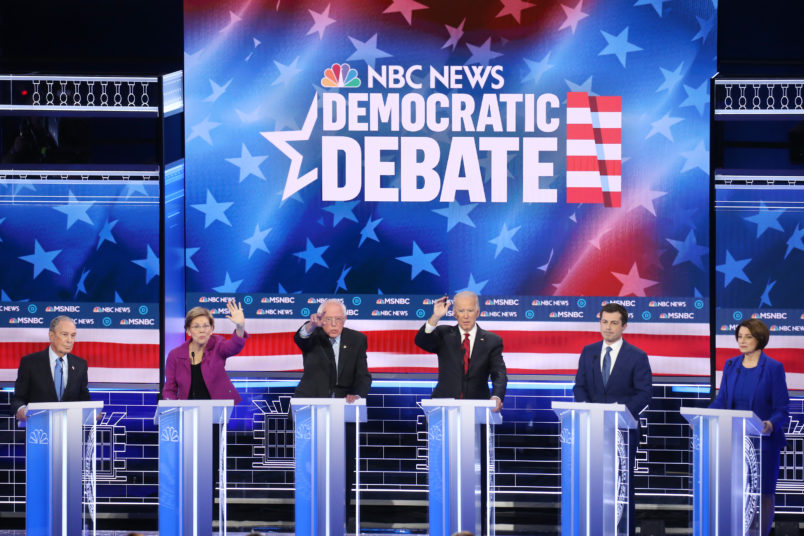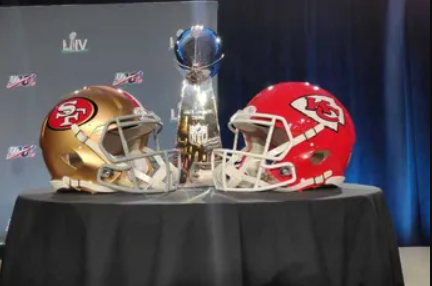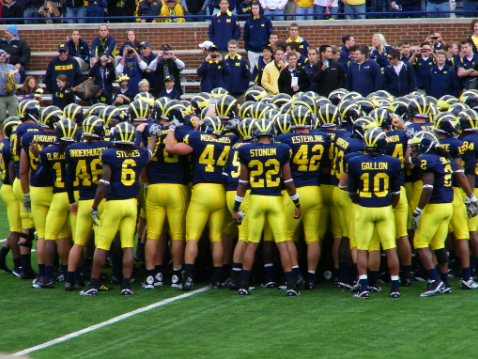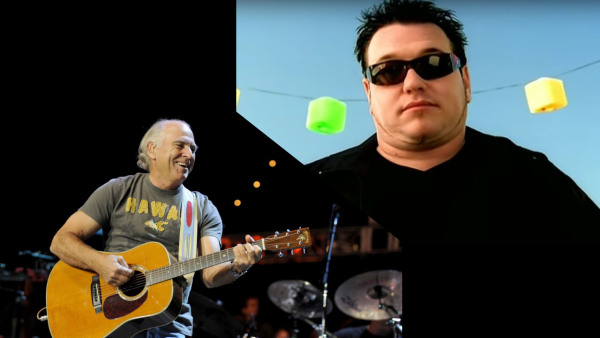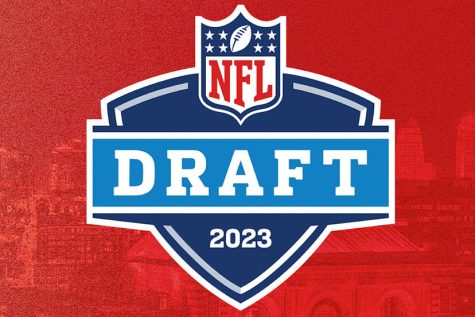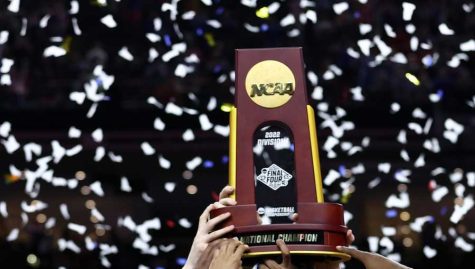What Happens in Vegas Won’t Stay in Vegas: the Ninth Democratic Debate
In a spectacular debate at the Paris Las Vegas resort, the Democratic candidates for president opened up new lines of attack on each other from healthcare to immigration, highlighting the bitter divides that still remain in the party. Pictured left to right are Michael Bloomberg, Elizabeth Warren, Bernie Sanders, Joe Biden, Pete Buttigieg, and Amy Klobuchar. Photo credits: Mario Tama/Getty Images.
LAS VEGAS, NEVADA—What a night! For eight debates the Democratic contender for the presidential nomination have been boxing with kiddie gloves on, but on Wednesday, February 19 at the Le Théâtre des Arts, in Paris Las Vegas, Nevada, the knives truly came out. The six candidates who qualified—Michael Bloomberg, Joe Biden, Pete Buttigieg, Amy Klobuchar, Bernie Sanders, and Elizabeth Warren—engaged in nothing short of a verbal firefight, throwing barbs and trading bombshells for two exhilarating hours. Rather than trying to keep the cool, the MSNBC moderators fanned the flames, goading the candidates to attack each other with leading questions.
The fiery departure from past debates (my coverage of the last three debates can be found here: 6th | 7th | 8th) comes as the primary enters its crunch season. While New Hampshire served to pare away the longshot candidacies of Andrew Yang, Michael Bennet, and Deval Patrick, there are still eight candidates in the running: the six at the debate, as well as fellow billionaire Tom Steyer and Hawaii Representative Tulsi Gabbard, the lone candidate of color left. With the Nevada caucus taking place Saturday the 22nd and the South Carolina primary the following week on the 29th, Super Tuesday—when over a third of the delegates will be up for grabs—looms on March 3. After then the pressure on low-polling candidates to drop out will grow insurmountable, a fate everybody is anxious to avoid.
Don’t Bring A Wallet to a Knife Fight
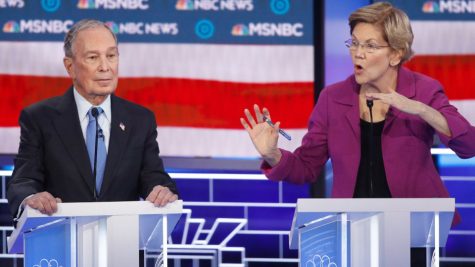
Billionaire Michael Bloomberg walked onstage with a giant target painted on his back and left peppered with bullet holes, his candidacy gravely if not mortally wounded. Equipped with a bottomless $64 billion net worth, for months Bloomberg had the luxury of ignoring the traditional path to the nomination. He joined in October, months after the rest of his rivals; he chose to skip the four early states, opting instead for the delegate-rich Super Tuesday states; and he refused to take donations, which prevented him from qualifying for previous debates.
Shielded from the scrutiny of the stage, Bloomberg has instead chosen to blanket the airwaves with his ubiquitous advertisements, running a jaw-dropping $400 million campaign that have seen his poll numbers rocket to second place. The Nevada debate, however, offered a dramatic change; for the first time, candidates would not have to meet a donor threshold, and could qualify by securing a delegate or polling above 10% in enough nationwide polls. As a result, for the first time, Bloomberg would appear on the stage alongside his veteran foes, and like all freshmen new to a gang, he was in for a hazing.
The battering began less than five minutes into the debate, when Massachusetts Senator Elizabeth Warren immediately pounced on Bloomberg’s record. In her first words of the evening, Warren attacked Bloomberg as “a billionaire who calls women fat broads and horse-faced lesbians” and likened his comments to those made by President Donald Trump. The parallels were unmistakable as she highlighted his “history of hiding his tax returns, of harassing women, and of supporting racist policies like redlining and stop and frisk” and argued that “Democrats take a huge risk if we just substitute one arrogant billionaire for another.”
No sooner had Warren finished than her fellow Democrats picked up the sword, leaving Bloomberg almost helpless to defend himself against the five-man pileup. Former Vice President Joe Biden condemned Bloomberg’s tenure as Mayor of New York, where under the policy of stop-and-frisk he had “[thrown] close to 5 million young black men up against a wall”. Vermont Senator Bernie Sanders reminded Bloomberg of his past support for Republicans and how he had even “supported George W. Bush for president” in 2004. Minnesota Senator Amy Klobuchar quipped that “I don’t think you look at Donald Trump and say, ‘We need somebody richer in the White House.’”
It was undoubtedly Warren who led the charge, however, and at the end of the first hour she once more incisively cut into Bloomberg with a brutal exchange over his company’s treatment of women, specifically how several female employees had signed “nondisclosure agreements both for sexual harassment and for gender discrimination in the workplace”. Bloomberg defended himself with a feeble claim that “we have a very few nondisclosure agreements” and that the only thing he was accused of was that “they didn’t like a joke I told”, drawing audible groans from the audience.
Without missing a beat, Warren coolly asked, “Some is how many?”, leaving the mayor seemingly at a lost for words. She then finished with a blistering peroration, denouncing Bloomberg’s “muzzling” of women and “the drip, drip, drip of stories” of harassment and discrimination as being electoral liabilities against Donald Trump and fundamentally “not what we do as Democrats.” Bloomberg was surely eternally grateful when the moderators cut to the first commercial break not long afterwards; ironically, a Mike Bloomberg ad was among those airing during the commercial break, but with his wallet as the only defense in a knife fight of a debate, he was clearly at a loss.
Not Going Down Without a Fight
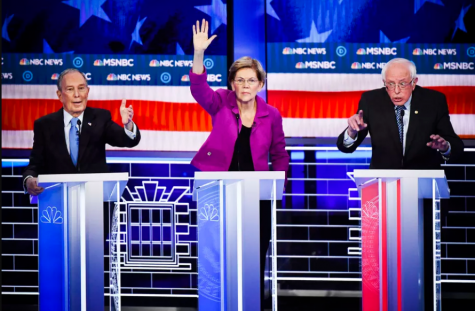
Warren’s aggressive strike against Michael Bloomberg grabbed the headlines, but her fierceness was by no means reserved for him alone. Over the course of the debate, Warren landed attacks against all of her primary opponents, often in the same ninety-second response. This represents a remarkable departure from form for the Massachusetts senator, whose modus operandi in the primary has been to play the “unity candidate” and restrain any attacks (though she did memorably skewer former Maryland representative and centrist candidate John Delaney, who has since dropped out, in July for “[going] to all the trouble of running for president of the United States just to talk about what we really can’t do and shouldn’t fight for.”)
One of her most effective criticisms came when she successively knocked Buttigieg, Klobuchar, and Sanders in the same breath over their healthcare proposals. She cuttingly described Buttigieg’s plan as “a slogan that was thought up by his consultants to paper over a thin version of a plan that would leave millions of people unable to afford their health care. It’s not a plan, it’s a Power Point”. Then immediately she turned to skewer Klobuchar for having a plan that is “even less. It’s like a Post-it note.” Finally, she criticized Sanders for “relentlessly attack[ing] everyone who asks a question or tries to fill in details about how to actually make this work. And then his own advisers say, ‘Eh, probably won’t happen anyway.’”
The whirlwind of attacks left the crowd roiling and her rivals fighting for the chance to respond first, with Buttigieg managing to snag the moderators’ approval. “I’m more of a Microsoft Word guy,” he nimbly responded. Klobuchar took the same approach, joking that “I must say, I take personal offense, since Post-it notes were invented in my state.” Sanders chose instead to pivot back to his stump speech, pointing out the benefits of his plan, saying “Canada can provide universal health care to all their people at half the cost. U.K. can do it. France can do it. Germany can do it. All of Europe can do it” and healthcare should be “a human right, not a privilege”.
Tellingly, however, Sanders avoided directly addressing Warren’s jab at how one of his top surrogates, New York freshman representative Alexandria Ocasio-Cortez, had admitted that his plan was unlikely to pass and would require compromise. For Warren, whose backslide in the polls came when she unveiled a Medicare proposal which would be gradually enforced (resulting in a barrage of criticism from the left), this double standard from the Sanders camp is surely maddening. While she never directly addressed the personal attacks on her, Warren took the chance to criticize Sanders’s online base for similarly vitriolic attacks on the Nevada Culinary Union for criticizing his healthcare plan, saying “we are all responsible for our supporters and we need to step up” and concluding “that’s what leadership is all about”.
This debate comes at a critical juncture for Warren, who turned in a lackluster performance in New Hampshire, coming in at 4th place with 9% of the vote. For a neighboring state, with a long history of favoring its Massachusetts cousins, it was a bitterly disappointing result that highlighted how far Warren has slid since she briefly became the frontrunner in October 2019. Bloomberg’s presence as a natural foil to the progressive firebrand who had made a name for herself grilling Wall Street CEOs after the Great Recession surely played some role in her new take-no-prisoners attitude, but so too did desperation for a much-needed burst of energy. She chanced a roll of the dice at Vegas—and she got it.
The New Unity Candidates
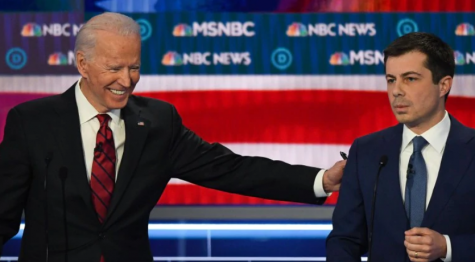
On the other hand, former South Bend, Indiana Mayor Pete Buttigieg and former Vice President Vice President seem to have made the opposite calculation, choosing to rely on their establishment support to make a case for party unity in the face of disruptors. From the left flank, Sanders, the longest-serving independent Congressman in history, racks up victories in Iowa and New Hampshire and seems poised for another victory in Nevada. On the right, Bloomberg, a former Republican, poses an existential threat to candidates’ chances during Super Tuesday in March.
Pressed from both sides, Buttigieg and Biden made clear appeals to party unity. Buttigieg made a passionate call for the Democrats to “wake up as a party” and realize that Sanders and Bloomberg, ”the two most polarizing figures on this stage”, could be the “only candidates left standing” after Super Tuesday. Buttigieg went on to assert that Americans should have more choices that “a socialist who thinks that capitalism is the root of all evil and a billionaire who thinks that money ought to be the root of all power.” Later, he returned to the same message, calling for Democrats to “put forward somebody who’s actually a Democrat” instead of choosing between “one candidate who wants to burn this party down and another candidate who wants to buy this party out”.
Buttigieg then specifically targeted Sanders and Bloomberg over their lack of transparency relating to their health records; Sanders suffered a heart attack last October and attempted to hide it for a few days, while Bloomberg hid for years that he had stents placed in his heart in the early 2000s. Buttigieg criticized Sanders’s continual refusal to release medical records, stressing that “Transparency matters, especially living through the Trump era”. Sanders shot back that “follow me around the campaign —three, four, five events a day, see how you’re doing compared to me” and pointed out that he and Mayor Bloomberg “both have two stents. It’s a procedure that is done about a million times a year,” but it reflects a question that his campaign has still not figured out how to effectively answer.
Biden did the same, strongly criticizing Bloomberg’s past history on stop and frisk, which allowed police officers to randomly search any suspected criminal, primarily targeting young black and brown men. Passion rising in his voice, Biden accused Bloomberg of only changing the policy when “Barack Obama sent moderators to see what was going on” and “when we sent them there to say this practice has to stop, the mayor thought it was a terrible idea that we sent them there.” Overall, though, with the other candidates too focused on attacking each other, over the course of the debate Biden was free to once again play the wise party elder above the fray.
The only memorable moment of conflict came when protesters once again interrupting his closing statements with calls of “3 million deported!”, referencing his role in the Obama administration’s immigration policy. Unfortunately, this doesn’t necessarily bode well for the former Vice President, who once enjoyed double-digit leads in the polls and was the center of attention at the debates. Far from the glory days when he attracted attacks from the likes of Kamala Harris, Eric Swalwell, and Julian Castro, his continual slip into seeming irrelevancy bodes ill for the future of his campaign as he retreats to his last stronghold of South Carolina, having ceded in rapid succession Iowa, New Hampshire, and now Nevada to his rivals.
Bernie Takes a Backseat

The one candidate who opted to play it safe, at least by his standards, was Senator Bernie Sanders. After the implosion of the Biden campaign in Iowa and New Hampshire, the former Vice President has nosedived in polling, leaving Sanders the undisputed frontrunner with 10-point leads both in Nevada and nationwide. Sanders’s steady message of Medicare for All and ending the exploitation of the working class is clearly working, and so in the Nevada debate he more or less stuck to his stump speech. However, after taking a backseat in the first hour, content to let Warren lead the vanguard of the Bloomberg assault, Sanders emerged in the second half to confront the billionaire himself.
After moderator Chuck Todd brought up one of Sanders’s old tweets claiming that “billionaires shouldn’t exist” by comically posing the question “should you exist?” to Bloomberg, the two engaged in a lengthy tit-for-tat over the issue of wealth. Sanders defended his beliefs by highlighting the disparity between rich and poor in the United States—pointing out that Bloomberg had more money than “the bottom 125 million Americans”, which he called “grotesque”. Bloomberg replied that he deserved his fortune because “I worked very hard for it” and pointed out how he gave much of his money away in philanthropy. He then attacked Sanders for being a “communist”, snapping that “I can’t think of a way that would make it easier for Donald Trump to get reelected than listening to this conversation.”
Sanders, a proud self-identified democratic socialist, shot back that “We are living in many ways in a socialist society right now. The problem is, as Dr. Martin Luther King reminded us, ‘We have socialism for the very rich, rugged individualism for the poor.” He went on to elaborate that when “Donald Trump gets $800 million in tax breaks and subsidies to build luxury condominiums” and “we have to subsidize Walmart’s workers on Medicaid and food stamps because the wealthiest family in America pays starvation wages, that’s socialism for the rich.” Instead, he asserted, “I believe in Democratic socialism for working people. Not billionaires. Health care for all. Educational opportunity for all.”
With an eye roll, Bloomberg continued by switching to a personal avenue of attack on Sanders’s wealth, saying, “What a wonderful country we have. The best-known socialist in the company happens to be a millionaire with three houses. What did I miss here?” With righteous fury, Sanders replied that “You missed that I work in Washington” (Bloomberg cut in with a snide “That’s the first problem”) and continued that he has a second home in Burlington, Vermont, as well as a summer cabin. “Forgive me for that,” he said. “Where is your home?” “New York City, thank you very much,” Bloomberg responded snidely. “And I pay all my taxes. And I’m happy to do it because I get something for it.”
The heated exchange between the two men, in many ways, is testament to Sanders’s remarkable rise to frontrunner in the Democratic party. Even ten years ago, to have a discussion about socialism in America in a presidential debate would have been unthinkable. Now Sanders has almost singlehandedly brought it into the mainstream. The race, in many ways, has now boiled down into Sanders vs. the Moderates, with Warren alone still attempting to straddle the divide. The matter was brought into sharp relief in the final question of the debate, with a question revolving around the case of a contested convention when no candidate had a majority and whether the person with a plurality should win the nomination. Sanders said yes; all the candidates said no. It was silent acknowledgement of Sanders’s dominant stature in the race.
Fratricide in the Center
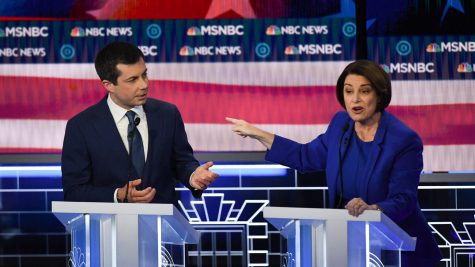
Sanders’s consolidation of the progressive wing comes in stark contrast to the fragmented nature of the centrists in the primary, highlighted by a bitter battle between the two ascendant Midwestern moderates, Pete Buttigieg and Amy Klobuchar. For months, the two campaigns have traded blows, but nothing approached Wednesday evening in terms of personal attacks or sheer vitriol. Klobuchar, a three-term senator, had long resented the fact Buttigieg, a 38-year-old mayor with scant national experience, had “cut in line” and siphoned off much of her support, and made his inexperience one of her central angles of attack over the past few debates. A widely-praised New Hampshire debate where she derided him as a “cool newcomer” saw her surge to a close third behind Buttigieg’s second, leapfrogging over former frontrunners Warren and Biden.
Unfortunately for Klobuchar, her surprise performance resulted in greater media scrutiny, and as the race turned to heavily-minority Nevada and South Carolina, questions swirled about her prosecutorial record in Minnesota ignoring accounts of police brutality and imprisoning innocent black teenagers. The worst stumble, however, came on Sunday, when in an interview with Telemundo Klobuchar was unable to name the president of Mexico, Andrés Manuel López Obrador. When pressed on the slip by moderator Vanessa Huac at the Nevada debate, Klobuchar squirmed, checking her notes when saying his name and likening it to “Jeopardy” questions like the number of representatives in the Israeli parliament.
Unimpressed, Buttigieg pounced on the error to make a devastating attack on Klobuchar’s argument for experience and electability. “You’re staking your candidacy on your Washington experience,” he said. “You’re literally in part of the committee that’s overseeing these things and were not able to speak to literally the first thing about the politics of the country to our south.” Visibly shaking, Klobuchar furiously rounded on Buttigieg, snapping, “Are you trying to say that I’m dumb?” she asked. “Or are you mocking me here, Pete?” Biden’s attempt to insert himself in the conversation by stressing how he was the “only one who knows this man and met with him” was batted aside as the two Midwesterners dropped their nice public personas to settle their public grudge.
Warren came to Klobuchar’s rescue, interrupting and asking “Can I just defend Senator Klobuchar for a minute? This is not right. I understand she forgot a name. It happens.” The simmering tension abated momentarily, but the personal feud only ramped up over the course of the debate, when later on Buttigieg once again criticized her for her record on immigration, approving Trump’s nominee for Customs and Border Control and voting to make English the national language, as well as being the most likely to vote for Trump’s federal judges “of the senators running for president,” including those who had already dropped out like Kirsten Gillibrand of New York and Cory Booker of New Jersey.
With dripping sarcasm, Klobuchar replied, “I wish everyone was as perfect as you, Pete, but let me tell you what it’s like to be in the arena.” As Buttigieg repeatedly interrupted and the moderators scrambled to break up the fight, she began rattling off a list of her bipartisan achievements. “You have not been in the arena doing that work. You’ve memorized a bunch of talking points.” Buttigieg shot back that “I’m used to senators telling mayors that senators are more important than mayors…You don’t have to be on Capitol Hill for your work to be significant.” The exchange left both wounded and looking petty, with Klobuchar storming offstage without accepting Buttigieg’s handshake, and leaves the moderate wing of the party no closer to consolidation.
Conclusion
The fireworks of the ninth Democratic debate ultimately cannot conceal the serious crisis that still grips the party: its seemingly irreconcilable divide between left-wing and the center. While Bloomberg’s debut spurred the other candidates to put on a rare display of unity attacking him together from all directions, the impasse grinds on, especially as the stubbornly high number of viable candidates continues to splinter party support. The likelihood of a contested convention at the Democratic National Convention in Milwaukee continues to grow, which, judging from the candidates’ lackluster response to whether they would support whoever wins the plurality, will risk even further dividing the country.
And yet, exhausting as it seems, the battle for the soul of the Democratic party is only half the war. Whoever emerges from Milwaukee with the nomination will then have to face President Trump in the battle for the soul of the United States. Although Bloomberg’s presence, as Warren put it, offered viewers a “live demonstration of how we each take on an egomaniac billionaire”, facing the incumbent president with overwhelming support from his own party will be no easy task. The Democrats cannot win through civil war alone, and despite the old maxim, what happens in Vegas won’t stay in Vegas; the wounds the candidates took in Nevada will surely resurface when the time comes to face Trump.

Vincent Jiang is currently a senior at West Morris Central High School and President of Journalism Club. Passionate about global affairs, he enjoys writing...

